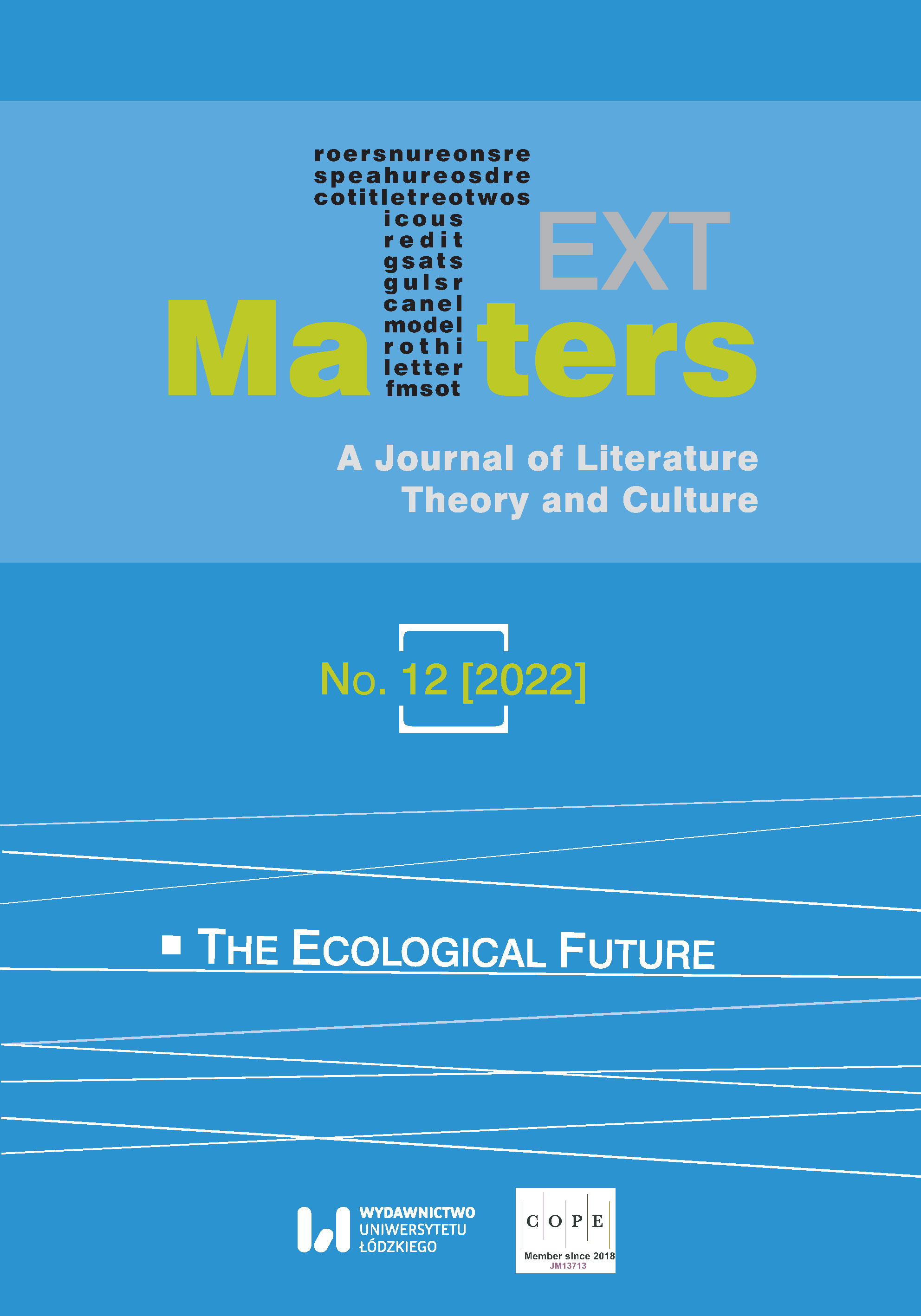Apocalypse When? Storytelling and Spiralic Time in Cherie Dimaline’s The Marrow Thieves and Louise Erdrich’s Future Home of the Living God
DOI:
https://doi.org/10.18778/2083-2931.12.13Keywords:
Indigenous literature, speculative fiction, apocalypse, storytelling, survivance, settler colonialismAbstract
Contemporary climate fiction (cli-fi) frequently invokes the concept of apocalypse to explore the experience of living through the era of unprecedented climate change and environmental disaster that has been named the Anthropocene. Yet, as often as apocalyptic narratives are deployed to express those anxieties and experiences, they so often ignore the histories and presents of peoples who have already lived through multiple apocalypses—in particular, the ongoing violence of settler colonial exploitation of the land now called North America. Considering the role that settler colonialism has played in the development of the current crisis, we turn to two recent works by the Métis writer Cherie Dimaline and Ojibwe author Louise Erdrich to consider how the act of cultural storytelling challenges Western notions of linear temporalities. Our analysis of Dimaline’s The Marrow Thieves will explore how the settler-colonial narratives of scientific progress is challenged through Indigenous storytelling and collective memory, and our analysis of Erdrich’s Future Home of the Living God will examine how Indigenous modes of understanding operate through a cyclical timescape that allows for alternative methods of existing with and within the larger world.
Downloads
References
Cox, Sandra. “Decolonial Speculative Fiction: Indigenous Resistance in The Marrow Thieves, Trail of Lightning and Storm of Locusts.” Journal of Science Fiction, vol. 5, no. 1, 2021, pp. 65–79.
Google Scholar
De Vos, Laura Maria. “Spiralic Time and Cultural Continuity for Indigenous Sovereignty: Idle No More and The Marrow Thieves.” Transmotion, vol. 6, no. 2, 2020, pp. 1–42. https://doi.org/10.22024/UniKent/03/tm.807
Google Scholar
Dimaline, Cherie. The Marrow Thieves. Cormorant, 2017.
Google Scholar
Dockry, Michael, and Kyle Whyte. “Improving on Nature: The Legend Lake Development, Menominee Resistance, and the Ecological Dynamics of Settler Colonialism.” American Indian Quarterly, vol. 45, no. 2, Jan. 2021, pp. 95–120. https://doi.org/10.1353/aiq.2021.0008
Google Scholar
DOI: https://doi.org/10.1353/aiq.2021.0008
Erdrich, Louise. Future Home of the Living God. Harper Collins, 2017.
Google Scholar
Fachinger, Petra. “Writing ‘Home’: The Healing Power of Métis Storytelling in Cherie Dimaline’s Red Rooms and The Girl Who Grew a Galaxy.” Studies in Canadian Literature, vol. 4, no. 1, 2018, pp. 146–67. https://doi.org/10.7202/1058065ar
Google Scholar
DOI: https://doi.org/10.7202/1058065ar
Hayman, Eleanor, in collaboration with Colleen James and Mark Wedge. “Future rivers of the Anthropocene or whose Anthropocene is it? Decolonising the Anthropocene!” Decolonization: Indigeneity, Education & Society, vol. 6, no. 2, 2018, pp. 77–92.
Google Scholar
Kimmerer, Robin Wall. Braiding Sweetgrass. Milkweed, 2013.
Google Scholar
Kot, Svitlana. “An Indigenous Woman in the Apocalyptic City: Exploring the Multifaceted Urban Panorama in Louise Erdrich’s Future Home of the Living God.” Rupkatha Journal on Interdisciplinary Studies in Humanities, vol. 12, no. 1, Jan. 2020, pp. 1–14. https://doi.org/10.21659/rupkatha.v12n1.01
Google Scholar
DOI: https://doi.org/10.21659/rupkatha.v12n1.01
Martínez-Falquina, Silvia. “Louise Erdrich’s Future Home of the Living God: Uncertainty, Proleptic Mourning and Relationality in Native Dystopia.” Atlantis, Revista de La Asociacion Espanola de Estudios Anglo-Norteamericanos, vol. 41, no. 2, Dec. 2019, pp. 161–78. https://doi.org/10.28914/Atlantis-2019-41.2.08
Google Scholar
DOI: https://doi.org/10.28914/Atlantis-2019-41.2.08
Orange, Tommy. There There. Vintage, 2018.
Google Scholar
Sium, Aman, and Eric Ritskes. “Speaking Truth to Power: Indigenous Storytelling as an Act of Living Resistance.” Decolonization: Indigeneity, Education & Society, vol. 2, no. 1, 2013, pp. I–X.
Google Scholar
Stookey, Lorena Laura. Louise Erdrich: A Critical Companion. Greenwood, 1999.
Google Scholar
Vizenor, Gerald. Survivance: Narratives of Native Presence. U of Nebraska P, 2008.
Google Scholar
Whyte, Kyle. “Indigenous Climate Change Studies: Indigenizing Futures, Decolonizing the Anthropocene.” English Language Notes, vol. 55, no. 1, 2017, pp. 153–62. https://doi.org/10.1215/00138282-55.1-2.153
Google Scholar
DOI: https://doi.org/10.1215/00138282-55.1-2.153
Whyte, Kyle. “Indigenous Science (Fiction) for the Anthropocene: Ancestral Dystopias and Fantasies of Climate Change Crises.” Environment and Planning: E. Nature and Space, vol. 1, no. 1–2, Mar. 2018, pp. 224–42. https://doi.org/10.1177/2514848618777621
Google Scholar
DOI: https://doi.org/10.1177/2514848618777621
Zanella, Patrizia. “Witnessing Story and Creating Kinship in a New Era of Residential Schools: Cherie Dimaline’s The Marrow Thieves.” Studies in American Indian Literatures, vol. 32, no. 3, 2020, pp. 176–200. https://doi.org/10.1353/ail.2020.0023
Google Scholar
DOI: https://doi.org/10.1353/ail.2020.0023
Published
How to Cite
Issue
Section
License

This work is licensed under a Creative Commons Attribution-NonCommercial-NoDerivatives 4.0 International License.













